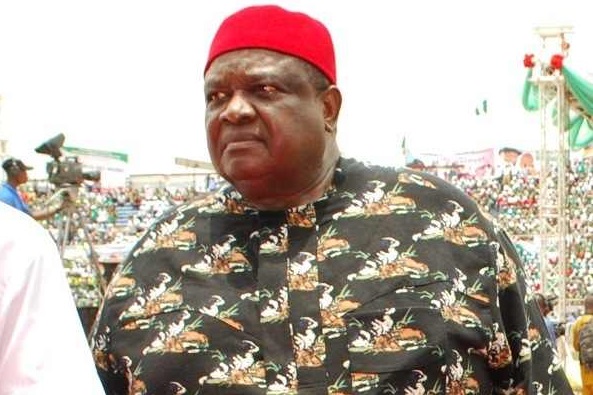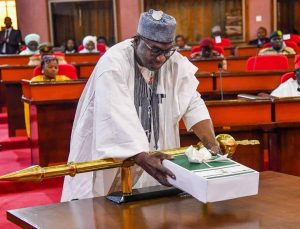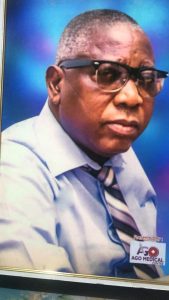Still on Iwuanyanwu’s ‘political rascals’ tantrum By Bola Bolawole

The dust is yet to settle on Chief Emmanuel Iwuanyanwu’s “political rascal” statement. Today, we present, with slight editing, the views of respected Professor Olabode Lucas on the burning issue; titled “The verbal sparks from Awka”; enjoy it:
“Penultimate Saturday, Professor Charles Chukwuma Soludo, the brilliant economist turned politician, rolled out the drums to celebrate his one year in office as the governor of Anambra State and, in doing so, tried to showcase the achievements of his administration during the one year. The occasion was attended by eminent personalities in and outside the state and they included Chief Olusegun Obasanjo, the former president who Governor Soludo affectionately referred to as ‘my Baba.’ There was no doubt that Soludo wanted as much publicity as he could get for the event. Yes, eventually the event got more publicity than what the governor had bargained for because the speech by the chairman of the occasion, Chief Emmanuel Iwuanyanwu, generated a lot of controversy. In his speech, Iwuanyanwu referred to the Yoruba people, who are in conflict with his Igbo people in Lagos, as ‘political rascals.’ This speech has caused a lot of political sparks and deepened the current seemingly unbridgeable animosity and suspicion between the Igbo and the Yoruba people which, unfortunately, has been festering since the colonial era.
“Chief Iwuanyanwu, who is the chairman, Council of Elders Ohaneze Ndigbo Worldwide, used these derogatory words against the Yoruba people in front of a mainly Igbo audience who cheered him enthusiastically. Obasanjo was in this audience and many people expected him to berate Iwuanyanwu for his undiplomatic language but, instead, he praised the chief for his role in helping him to form his first cabinet in 1999. In addition, in his speech Obasanjo threw his own verbal salvo when he alluded that the Igbo people were being subjected to Igbophobia.
“Chief Iwuanyanwu’s effusion at Awka was a continuation of unending suspicion that has characterized the relationship between the Igbo and the Yoruba ever since the British brought the two ethnic groups together in a country. Although the two ethnic groups were in the forefront of the struggle for the independence of the country, this was not sufficient to prevent them from being at each other’s throat on some contentious issues. All efforts to bring the two groups together politically as we saw in the recent move to initiate a ‘handshake across the Niger’ have always ended in failure because of the deep-seated suspicion between the two ethnic groups.
“During the colonial era, the theatre for the antagonism between the two groups was in Lagos, the then capital of the country where most of the political activities in the country took place. The Igbo people met the Yoruba people in Lagos as a highly sophisticated, enlightened group who were well educated. The Yoruba people were dominant in virtually all the sectors such as education, commerce and the civil service. This, no doubt, bred resentment and the Igbo with determination decided to catch up. The late Chinua Achebe, the literary guru of Igbo descent, in his book ‘There Was a Country’ had this to say on how the Igbo bridged the gap between them and the Yoruba: ‘The Yoruba had a huge historical and geographical head-start; but the Igbo wiped their handicap in one fantastic burst of energy in the twenty years between 1930 and 1950’. This touted achievement of the Igbo people by Achebe made the then Ibo State Union in one of its conferences to refer to the Yoruba ‘as a decadent race’
“Where did the rain start to beat the two ethnic groups? Contentious issues that divided the two groups during the colonial era probably had their beginning with the inability of Dr. Nnamdi Azikiwe, an Igbo man, to become in 1952 the Leader of Government Business/Premier of Western Nigeria, which was a region populated mainly by the Yoruba people. The Igbo people felt that Azikiwe, who was their idol, and his party, the NCNC, were deprived of victory by the Yoruba-dominated Action Group party. Since that time, an average Igbo person had not forgiven what they erroneously termed ‘the betrayal of 1952’. Many independent commentators had faulted the assertion that Azikiwe won the election of 1952 and even Azikiwe himself in his book titled ‘My Odyssey’ did not claim to have won the election. However, the defunct West African Pilot continued to propagate this falsehood for many years.
“The status of Lagos was another issue that also divided the Igbo and the Yoruba during the colonial era. At the 1953 constitutional conference, delegates from the then Eastern Region who were mainly Igbo made it clear at the conference that they regarded Lagos, the country’s capital, as ‘no man’s land’ despite the fact that a prominent Igbo political scientist, Kalu Ezera, had, in his book, previously referred to Lagos as a ‘Yoruba town’. The Igbo people and the NCNC, which they supported massively, succeeded at that conference to get Lagos, a Yoruba town, as the Federal Capital Territory. This arrangement, which continued until 1967 when Lagos State was created by Gowon’s administration, was resented by the majority of Yoruba people with their slogan ‘Lagos belongs to the West’.
“The antagonism between the Igbo and the Yoruba during the colonial era was fuelled by the newspapers owned by the two groups. The West African Pilot owned and edited by Nnamdi Azikiwe defended the Igbo cause and aspirations while the Daily Service edited by H.O Davies and later by S. L. Akintola was the Yoruba’s mouth-piece. The West African Pilot at every opportunity denigrated Yoruba leaders like Kofo Abayomi, Adeyemo Alakija, Akinola Maja, H.O. Davies, Akintola, and F. R. A. Williams. The West African Pilot through its editorials and news items built up the Igbo as a master race and projected Nnamdi Azikiwe as the only leader worthy of emulation in the nationalistic struggle. The Daily Service, while projecting the Yoruba cause, was less vitriolic.
“The suspicion and antagonism between the two groups was probably responsible for the refusal of Nnamdi Azikiwe to form a pre-Independence coalition government with Chief Obafemi Awolowo that could have ushered in independence for the country despite the intervention of President Kwame Nkrumah of Ghana. The arrangement could have made Azikiwe the first prime minister of independent Nigeria; instead, he opted to be a ceremonial president in an NPC/NCNC coalition government.
“The political antagonism between the Igbo and the Yoruba continued after independence. The main political tendency in Yoruba land was kept out of government for a considerable length of time from 1954 to 1964 at the time when the NCNC formed the coalition government with the NPC at the federal level. During this period, the Igbo dominated the federal government and cornered juicy contracts, appointments and scholarships to themselves. The same scenario was enacted in 1979 when the NPP, a party dominated by the Igbo people, had a working arrangement with the NPN.
“The Igbo came back from the civil war with a lot of resentment and bitterness for the Yoruba people because of the role they perceived was played by the Yoruba and their leader, Chief Obafemi Awolowo. The Igbo people believed that the policies initiated by Chief Awolowo as Commissioner of Finance during the war brought about the collapse of Biafra. Many Igbo also felt that the Yoruba should have joined them in bringing an end to Nigeria. The Igbo showed their resentment to Awolowo by giving him less than one percent of the votes cast in their region during the 1979 presidential election. All in all, for most of the political events since independence, the Igbo and the Yoruba have always been at opposite sides to each other.
“In all these disputations between the Igbo and the Yoruba, the Igbo have always presented themselves as victims and that is why some of their leaders throw occasional verbal salvos like the one thrown by Chief Iwuanyanwu at Awka to denigrate the Yoruba people and their leaders. That is why Nnamdi Kanu could call on EndSARS protesters from his cell to destroy properties of Yoruba people in Lagos. The Yoruba, though not perfect and have faults of their own, have been very accommodating to the Igbo people with the opportunity given to them to prosper immensely in Yoruba land. The Yoruba people claim with justification that there is no reciprocity for their good gestures from the Igbo people.
“Whatever is the situation between the two groups, they have to accommodate each other as long as they belong to this geographical entity called Nigeria, which is yet to become a nation in the true sense of the word. For now, I cannot see an end to these disputes as more destructive verbal salvos like the recent one from Chief Iwuanyanwu would still come from the leaders of the two ethnic groups to denigrate one another”.
The above is from Professor Lucas, who writes from Old Bodija, Ibadan. Other views on this contentious issue are welcome!
*Former Editor of PUNCH newspapers, Chairman of its Editorial Board and Deputy Editor-in-chief, BOLAWOLE was also the Managing Director/ Editor-in-chief of THE WESTERNER newsmagazine. He writes the ON THE LORD’S DAY column in the Sunday Tribune and TREASURES column in New Telegraph newspaper on Wednesdays. He is also a public affairs analyst on radio and television.







